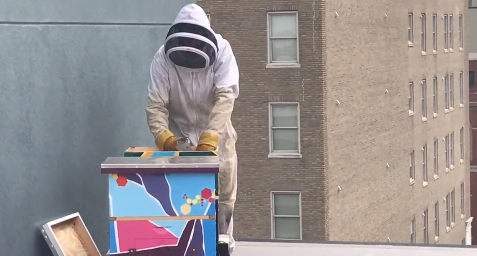Carolina Urban Beekeepers Saving Bees This Winter
January 29, 2018
With colony collapse disorder (CCD) forcing honeybees into the spotlight in the worst possible way, many, many efforts both small and large have been put forth to preserve the crucial pollinators. Among those efforts, a new one has popped up in a likely lesser known spot compared to others—Winston-Salem, North Carolina, with the conservation program being called, “Bee Our Future.”
This urban beekeeping initiative hopes to spark more awareness in its local community of bee conservation. Josh Pietrafeso, the program founder, is saying the current nationwide losses of honeybees are approaching a yearly average of 45 percent, which makes his local program crucial as a contributing effort.
This program works by placing bee hives on the rooftops of commercial buildings. Businesses who are interested pay a slight fee, and the program does the rest. Prices that commercial properties can expect range between $250 and $450, though it depends on what a business wants from the initiative, which offers shirts, tours, honey, and employee education. Since the program’s launch, Pietrafeso claims over a dozen local businesses have already signed up.
As to how the current winter temperatures have been affecting the bees, Allison Bowling, Pietrafeso’s wife and fellow operator of Bee Our Future, said honeybees form clusters in cold weather, where worker bees surround the queen bee and vibrate their bodies in order to ensure she’s warm, thus guaranteeing the hive’s survival. They typically don’t go outside the hive if the temperatures drop below 45 degrees. As to how this affects how Bee Our Future operates, per Bowling, they tend to leave all the hives to themselves during winter to keep the cold from getting into the hives.
“We spend a lot of time preparing the colonies for winter by adding supplemental food stores, making sure they have enough honey and are in good health to give them the best chance for survival,” Bowling said. The program also makes sure that snow doesn’t threaten their hives in any way or jeopardize essential hive equipment. “For instance, we will add an upper exit/entrance to the boxes in case a deep snow was to block the lower one. It also acts as a vent to let the condensation inside the hive escape, so the bees aren't living in a humidity dome. For the most part, though, they are perfectly adapted to winter in our climate,” Bowling said.
Beyond snow, there are more direct threats toward a hive’s safety in winter, says Bowling, such as varroa mites and similar parasites, pathogens, and whether or not they have enough food. “A common mistake we see new beekeepers make is getting excited about your first honey harvest and actually taking too much from the hive. [Honeybees] do need a fair amount of food to get through the season,” Bowling said. Bee Our Future will continue to spread awareness about bees throughout North Carolina, an effort that is made even more necessary with each passing year.
Photo via Journal Now Video Screenshot


.jpg)



